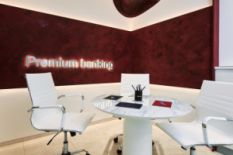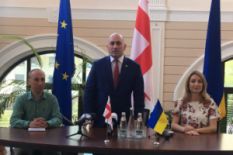Nestle started its operations in Ukraine in 1994. Today, Nestle Ukraine & Moldova employs almost 5,500 people. The total sales of the Company in Ukraine in 2018 amounted to UAH 10 billion, and it invested UAH 215.8 million into improvement of its production capacity. What are Nestle’s plans for the future in Ukraine?
Nestle is a company with over 150 years of history and traditions. And along this — a company that meets the modern challenges on the market. What is needed for a successful transformation of business processes and management models?
In fact, part of the answer is already in the question. I believe Nestle is a very successful company because it has been able to continue transforming itself to constantly be itself. Transformation is a part of our DNA. Transformation and agility to adapt to a changing world and changing trends to be able satisfy consumer needs and always been modern. Not bad for a company with 152 years of age! For Nestle success meant agility to continue reviewing your business models, never think there is one-size-fits-all. We operate in different markets in different operating models and in different zones in organizational models. The way we are structured in what we call zone EMENA (which is basically the Ancient continent with Europe Middle East and North Africa) is quite different from the way we work in New continent in AOA zone (which is Sub-Saharan Africa, Oceania and Asia) and is also different from the way we operate in Americas zone. This allows Nestle to keep a very strong link with reality and to have constant touch with consumers and therefore to adjust our portfolio and our operating models appropriately.
You ask what is success for Nestle, and I would say success is not by chance. Success is always by choice. You choose to be successful and you make choices that allow you to be successful which means, as I said, reviewing your previous choices, analyzing and making new ones.
Success is not by chance, success is by design. You need to orchestrate yourself and your business models to allow the choices to be deployed in the market place. This requires everyone in the organization to understand what the priorities are and ensure that each and every member of the company gives the maximum contribution to achieve our ambitions. To do that you need to ensure that communication flows in the organization are clear, lean, and constant.
Finally, for me success is not achieved by chance but success is by will. There is a strong determination in Nestle people to win and winning is what we are here for. For me winning means first of all being the preferred choice of our consumers for the quality and superiority of our products. And as well means being a driver in the categories we have decided to be present, as well as being recognized by our customers because we bring value to them with our innovation, with our brands and with our product ranges.
What determines the business mindset of the company nowadays?
As it has always been the mindset of a company is determined by the people who lead it. We may also ask what makes people believing in a company and keep its employees aggregated and motivated. And the answer to that is clearly the purpose the company has, the “Why” the company exists, and the vision of the company is more than the “what”.
Nowadays, I think there is no company that can allow itself to think business without having to consider the business impact in the long term. We are actually living interesting times where politicians are asking business leaders to have an active role in the society and environment and therefore to help Head of State and Governments to implement their social and environmental agenda. Business leaders now move the perspective to a much longer horizon thinking about the sustainability of their business models and this has a strong repercussion on the business mindset. Business leaders cannot be withdrawn from this, because we have a responsibility towards future generations. Companies, that used to be very short term focused on this year profit and next year profit now are becoming much more long-term focused because they have to. Nestle employs more than 400 thousand employees across the world and have an impact on a factor of three on families. This is why in our Purpose we are guided by a sustainable business -- “Enhancing quality of life and contributing to a healthier future”. First of all, otherwise we will not be sustainable and Nestle would not celebrate another 150 years of success. And second, because our consumers want us. Consumers today are looking for a company they may refer to as a reliable company. As I said, the business mindset is to have long term determination to be successful, working with ethics, putting quality and innovations as a foundation and being at the edge of consumers’ trends constantly.

Today Nestle is the world’s largest food and beverage company. What changes food industry will undergo in the near future?
When answering this question I would like first to connect to the previous point. Sustainability and long-term perspective means also realizing that the world population will reach 10 Billion people soon. How can we ensure that the company like Nestle can contribute to feeding ten billion people all over the world? We want to be part of the solution, we have to. The availability of proteins and the availability of food is completely disproportional nowadays. The same applies to utilization of resources worldwide. The source of protein has to change dramatically, because we will not be able to sustain the future needs of proteins with current methods. And again policy makers, industry and society has to take collectively this challenge and act together.
To answer more precisely your question I believe that the future of food is about healthy, sustainable and personalized. Healthy food is about its quality, quality of ingredients, and quality of nutrients. Sustainability is about the way you produce, the way you source materials and the way you utilize available resources. Personalization is also critical. More and more consumers want to have something, which is tailored to them. “Consumer needs” are more and more becoming “consumer wants”. Nestle is moving fast in this direction. For example, recently we have acquired a majority stake in Tails.com, a direct-to-consumer, tailor-made dog nutrition business. But we are also investing in robotization and automatization with bots, which pack the products in a different way according to the request from consumers. This is the type of personalization I can talk about for this moment and more to come for sure.
Food industry like every other industry will go through a massive disruption driven by digitalization. Digitalization and widely spread technology have already disrupted many business sectors (think about hotel industry, music industry and taxi, for example) and will be a driver of disruption in food and beverage business as well. In a way it has already happened. Digitalization allows consumers to talk about our brands much more than I could even dream ten years before. Today it doesn’t matter what I say about our brands. Yes, I have to put all the TV ads to create awareness but most important is what the consumers say to each other in a social media, the pictures they share, the placements they are and so on. The only way I may influence it is by guarantying the best quality I ever can produce. Quality is a foundation. Working with long term ethics, which we can respect, is also foundation. And what goes on top is the fact that my products are constantly on the edge of consumers trends. Recently we have launched new product called Incredible burger (we have not launched it in Ukraine yet but we will do this someday). The Incredible burger is a burger that actually tastes perfectly like meat but is coming from completely vegetarian source of product. This will create for sure a positive attitude towards our portfolio.
.jpg)
How to develop a corporate culture and convey company's values to a team? What top manager should do to motivate and encourage his team to generate new ideas to increase business efficiency?
I believe that the role of the leader is to ensure he or she nurtures that next generation of leaders. I am not a leader that wants to have a lot of followers. My role as a leader is to ensure that I create the conditions for the next leaders to grow. And how do you do that? Empowering people, allowing people to liberate their talents and ensuring that their talents are not put in a cage because of the risks they are afraid of. Rewarding failures sometimes is needed because after the failure we learn something and thus we know how to do it better next time. I am a type of leader that allows full action not only exploration and testing. I have a lot of mottos and one of them is “Done is better than perfect”. People in Nestle have a drive for action and desire to perform. Being a long time on top position you may see immediately if the person has this power and energy.
Nestle is investing in technologies, product competitiveness and working conditions improvement. What are the priorities of the company in business development in Ukraine?
Nestle has been 25 years in Ukraine. We are here to stay and to win. We are not here to test, try and maybe leave. This is clearly our vision.
Nestle has invested significantly in Ukraine; we have three big assets in terms of factories in Torchyn near Lutsk, Kharkiv and Lviv, two big warehouses plus business center in Lviv. With our head-office in Kyiv and our sales offices in the regions we employ about 5500 people in Ukraine.
The business foundations for Nestle are quality, compliance and safety.
So primarily the investments are focused on constantly improving around these three areas. About quality I have already spoken about. When it comes to safety, I want to be sure that all my employees come home after their working day in the same condition they have left home, or actually happier. For this you need to create the conditions but most importantly you need to infuse the right mindset. In terms of future and current investments, we are expanding the production capacity of our Mivina factory to produce more premium products for local consumption and for export. Mivina factory is the only noodle factory for Europe, so all the Nestle noodles sold in Europe are produced in Kharkiv. That is why we are making a big investment in this factory that has three phases and will continue until 2021. We are also investing in a new streamline in our chocolate and wafer Svitoch factory in Lviv, expecting the increasing of volumes coming after we have moved production from other factory abroad.
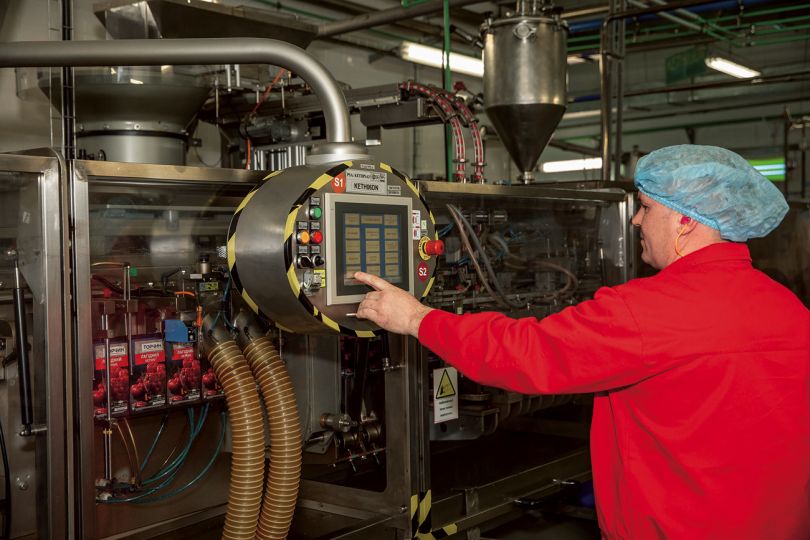
Can you share your vision of Nestle in Ukraine development for the next years with us?
Nestle has been 25 years in Ukraine. We are here to stay and to win. We are not here to test, try and maybe leave. This is clearly our vision.
We are currently present in many categories but I would prefer to say we are now present in many daily consumer acts, from morning coffee to indulgent chocolate, from healthy breakfast cereals to tasty meals aids and sauces, from energizing snacks to water. We cover the needs of newborns with our baby food range that has unbeatable quality and at the same time in our portfolio we have our pet food range to cover the needs of the extended family members. So I would say we cover the needs of extended idea of families.
At the same time we are still seeing many opportunities to enlarge our portfolio of products and brands. Innovation and offering higher valued products critical for our success and this is where we will focus, in priority. We are still missing some loved international brands here that are well known in Ukraine. We have recently closed the deal with Starbucks Coffee for retail business. Capturing the trends of vegetarian foods is also interesting. These are the potential areas for the future development and growth for Nestle in Ukraine.
Nestle Business Service center in Lviv is one of the six Nestle service centers in the world. What is it focused on?
Since the beginning in 2011 and to this day, the NBS Lviv team has grown from 50 to over 1200 people and we are planning to make it 1600 people this summer. NBS Lviv features in the area of financial services, HR services and digital services. Now we are serving about 30 markets of what we call EMENA zone there, including Ukraine, Scandinavia, Baltic and Adriatic countries, Greece, Italy, Russia, as well as Nestle companies in Japan, North America, Brazil and Colombia. We found Lviv a perfect nest for these activities. Before the center was established, we analyzed where the future generation of well-educated people is present and Lviv was coming up very high.
What, in your opinion, are the peculiarities of doing business in Ukraine?
The nation is very much worried about what will happen tomorrow. So there is a tendency to have a short term view. This tendency is quite common in Eastern Europe. The very specific in Ukraine is the difficultness to produce more premium products because people have very low ability to spend. But this is evolving. People recognize the quality of buying more premium products in exchange of high performing products instead of buying potentially cheaper products but not performing. We have to convey the good value for money concept. We have to convey products cost more for a reason; they don’t cost more just because we want to be more profitable.
What will you advice to Ukrainian companies that are seeking to succeed in their business and prosperity of the country as a whole?
Since I’ve been here I’ve been hearing business owners asking politicians to fundamentally fight corruption, fight grey or shadow economy (the way you want to call it) and to impose a full rule of law. As a multinational company, we have an obligation to continue to push for that. But first of all – to operate like that. We are not the only one multinational company here and we can impose business ethics in Ukraine. Anytime we somehow find either our people or our partners are not compliant, well, we act accordingly. We may potentially loose a part of our business but I’m not interested to keep a business which is not compliant. So my advice to whatever company works here is to be responsible, impose ethical and compliant business operation.
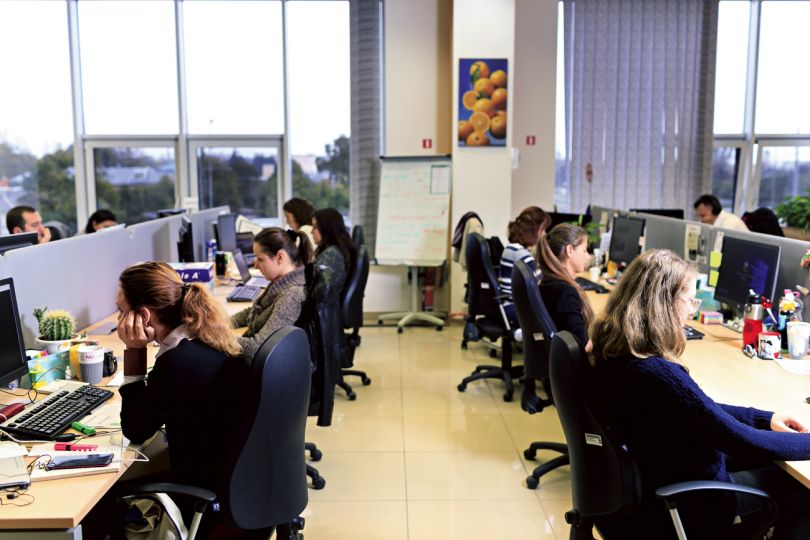
The other issue I want every company to contribute here is that we need Ukrainians to stay in Ukraine. We need to consider this seriously. I would really like to ask policy makers to create the conditions to offer our employees better conditions, to invest in them in order to retain them.
We have to create appropriate conditions that allow Ukrainians live and work in Ukraine and earn the living they may expect.
How do you asses Ukraine’s chances to become a strong player on global food market?
Ukraine is already very strong in certain sectors. It is one of the top global producers and exporters of grain crops and sunflower oil and it has the biggest proportion of black soil in the world. Therefore, for me the question is why we are not using it properly? I believe the agripreneurship is one of the areas where Ukraine should focus more. In this respect, we already launched project, which I believe would become bigger. We call it “Hospodar”. This project is about educating present and future generation of Ukrainian farmers to take the best out of their soil: to use the soil properly and to produce locally, focus on biodiversity and growing their farms responsibly. To be competitive on the market one may have to sacrifice the quantity for the ambition of better quality. And we want to relevance further with this project. The one of the results related to this project is that we have developed unique type of locally sourced tomatoes used for producing of our ketchup.
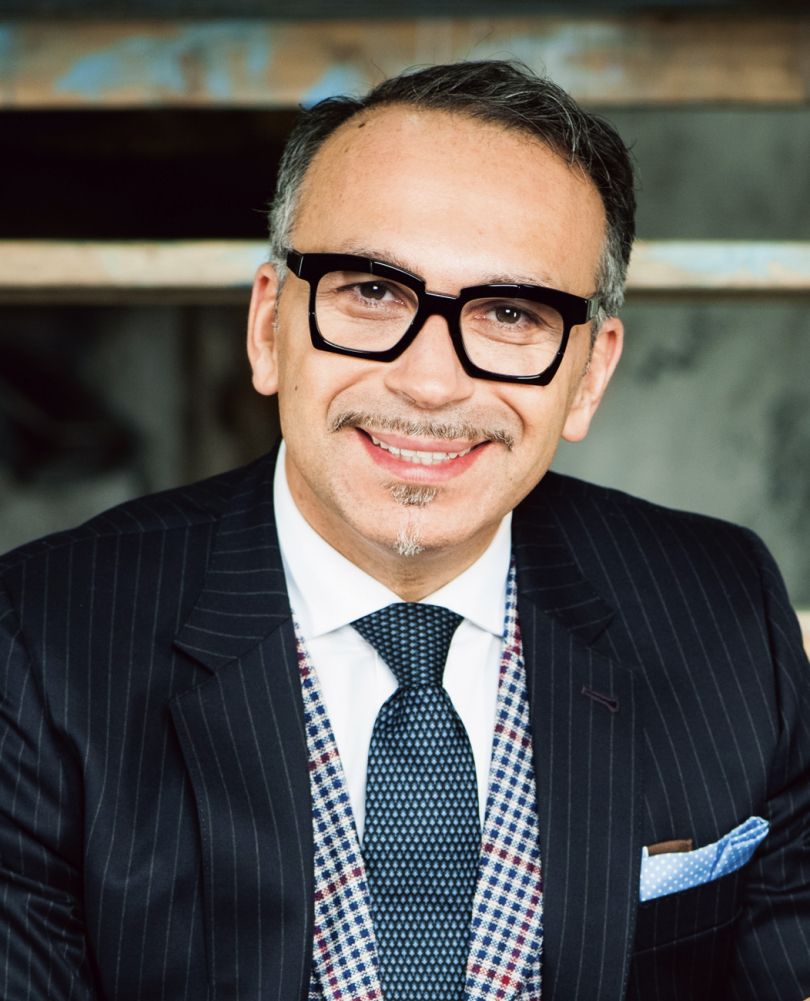
What are your insights for personal growth and success?
As a professional, you need to enjoy what you do. There wasn’t a day that I’ve come to the office empty or not energetic, because I really like what I do. So you need to find your field. I’m coming from a family of financial consultants actually dealing with either merges or acquisitions and bankrupts and this is what I have started and been educated. And there was a big disappointment with my father and with my brother who created a dynasty of financial consultants when I’ve said I would be working in marketing. My father looked at me with big open eyes and said: “You will gain one tenth of what you may gain tomorrow working here”. “Yeah, but I would be here one tenth happy than what I would be if I go there”. I’ve started my career in Nestle and I’m still in Nestle. I’m 25 years in Nestle and Nestle is 25 years in Ukraine, so guess there must be a reason why I’m here now. You need to find what makes you happy at work and generally in life of course. I have satisfaction in my work and it comes from the people. I really like to work with people, I really like to be surprised. I never stop to be surprised of how much people may surprise you. If you stopped to be surprised you have to ask yourself whether you are at a right place and whether you motivate your people right.
Does your Ukrainian team surprise you?
They do everyday! As I told you, I think we need to liberate enthusiasm a little bit in Ukraine. My role here is to liberate energy and courage. Ukrainians are very talented people but for some reason they don’t dare, they don’t believe in big things. I see my mission here in making them believe in their potential, their talents and their skills. And also – in making the impossible happen because impossible happens every day. As Mandela said: “It is impossible until it’s done”.
What are your impressions about Ukraine and Kyiv?
The city and the country are welcoming me with open hearts and with open hands. The city is very alive and very active, a lot of things are going on. Somehow, things are happening here much faster than in Western Europe.
What do you tell your foreign partners and friends about Ukraine?
I tell them to come and visit me to discover Ukraine for themselves. This is a very picturesque country with very different landscape from Carpathian Mountains to Black and Azov seas, and wide variety of cultural sights to visit. When I have friends coming here I show them traditional sights of Kyiv: Khreshatyk, Saint Sofia Cathedral, Opera House and Dnipro riverside.. But at the same time I bring them to the wall of St. Michael Golden-Domed Monastery painted with a religious fresco to make them realize that Ukraine is a country still at war. Even though the country is going through the hard period right now, it has a big potential for growth and development thanks to highly educated and hard-working people, natural resources, such as black soil and cultural heritage.
